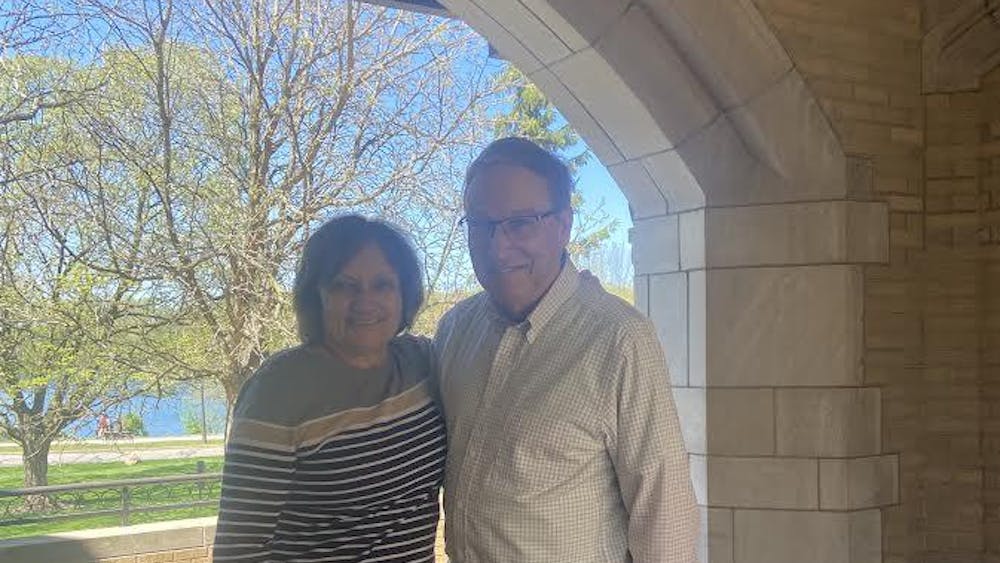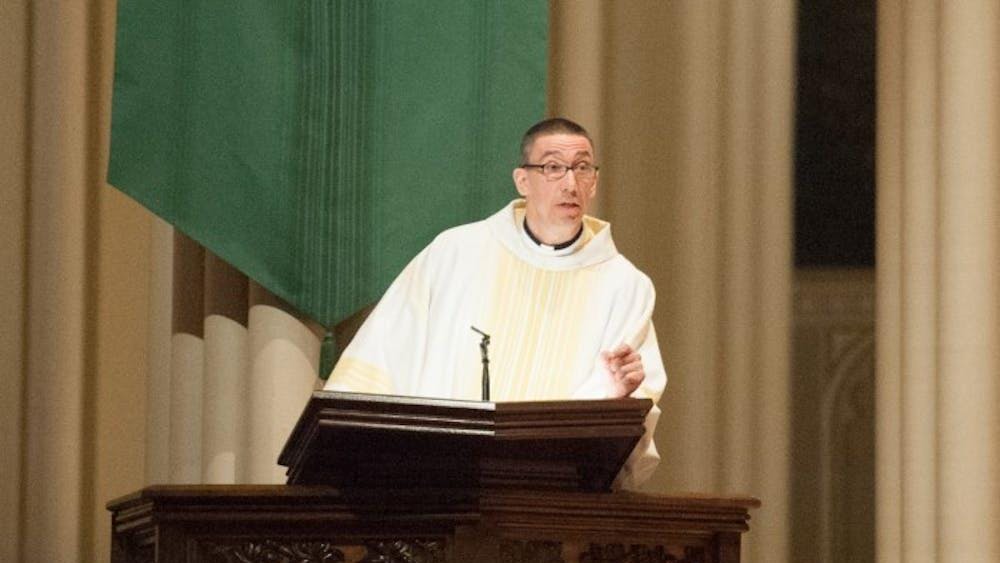Fr. Greg Boyle, head of a prominent Los Angeles gang-intervention network, delivered the annual Rev. Bernie Clark, C.S.C. Lecture on Tuesday night, encouraging a standing-room-only audience to create a “community of kinship” in order to achieve social justice.
Boyle is the founder and director of Homeboy Industries, which provides education, social services and job opportunities to former gang members and prison inmates. His talk, “Hope and Joy in the Hood,” focused on forming relationships and being in solidarity with marginalized members of society.
“All of us are invited in our own way to imagine a circle of compassion and then imagine nobody standing outside that circle, and so we’re invited to dismantle the barriers that exclude, and we’re invited to stand at the margins,” Boyle said. “… Stand with the demonized, so that the demonizing will stop, and with the disposable, so the day will come when we stop throwing people away. I suspect that if kinship was our goal, we would not be seeking justice; we would be celebrating it.”
To illustrate his point, Boyle told stories from his 30 years working in Los Angeles with “homies,” his term for former gang members. Often drawing laughter from the audience, he recounted the expansion of Homeboy Industries from a converted convent where Boyle and his colleagues educated gang members and helped former prison inmates find odd jobs to a citywide network of educational initiatives, interventions and small businesses, which include restaurants, a farmer’s market and a solar panel installation team.
Boyle said members of rival gangs often had to work alongside one another, increasing the sense of kinship among them, and Homeboy Industries’ businesses often brought together unlikely combinations of “homies,” politicians and entertainers.
In one story, Boyle said Oscar-winning actress Diane Keaton ate at Homegirl Cafe, one of the restaurants in the Homeboy Industries network. He said Keaton’s waitress, after trying to figure out how she knew the actress, asked if they had served prison time together. Boyle said the incident reflected the bonds of kinship Jesus calls for.
“You don’t hold the bar up and ask anyone to measure up; you just show up and you hold the mirror up and you tell people the truth, knowing that your truth is my truth and my truth is your truth, and it all happens to be the same truth, and here’s the truth: you are exactly what God had in mind,” Boyle said. “… Occasionally what you have to do is reach in and dismantle the messages of shame and disgrace that get in the way, that keep people from seeing their truth.”
Boyle said doing service work means accepting that all people need healing. In another story, Boyle said he once gave a talk with a “homie,” who told a shocked audience his story of abuse and neglect at the hands of his mother. Boyle said the man hid his scars for years before embracing them.
“‘After all,’ he says, ‘how can I help heal the wounded if I don’t welcome my own wounds?’” Boyle said. “And awe came upon everyone. The measure of our compassion lies not in our service of those on the margins, but in our willingness to see ourselves in kinship with them.
"There’s an idea that … there are some lives that matter less than other lives. How do we, together, stand against that idea? How do we stand at the margins and hope that they’ll get erased, even as people accuse you of wasting your time … how is it not the job of every person of faith to make those voices heard?”
Boyle said people who want to solve social problems first have to find the right “diagnosis,” or cause of the problem. He said young people join gangs in order to flee past pain, and solving the problem of gang violence involves giving people the love and support they might not have had before.
“If love is the answer, community is the context, tenderness is the methodology. It’s how you repair attachment,” he said.
Boyle concluded with a story about two “homies” from rival gangs who worked at the same job at Homeboy Industries. He said one of the employees was later violently killed, and as he passed away, his former rival grieved the loss of his friend. Boyle said by building relationships with the marginalized, people can diminish the margins themselves.
“It shouldn’t surprise us that God’s own dream come true for us that we be one, just happens to be our own deepest longing for ourselves,” Boyle said. “For it turns out it’s mutual, so we inch our way out to the margins, and we stand there. God erases those margins because you chose to stand there, and people who formerly were unwelcome have now been brought in.”












